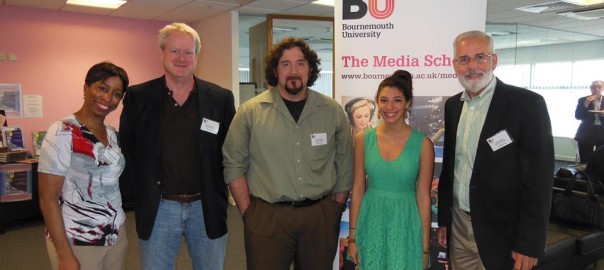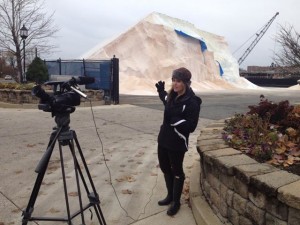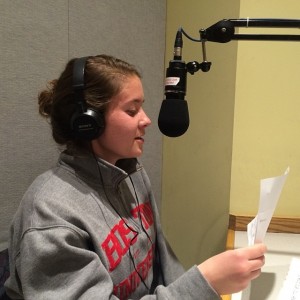By: William McKeen
I get this a lot: “Why should I let my kid study journalism? Isn’t it a dying business?”
These days, parents generally escort their children through college preview or orientation events. The students ask about the schooling and the opportunities, then the parents ask that inevitable question. I have a response ready.
“If journalism is a dying business, then we are a dying species,” I tell them.
“If journalism is a dying business, then we are a dying species,” I tell them. This befuddles the parents – befuddling being part of the job for a professor – but then I elaborate.
Do not confuse journalism with the newspaper business. I am far from convinced that the newspaper business is dying. It is in transition, but I understand where the “dying business” comes from: look at the stories of old newspapers folding and the massive layoffs at even the healthiest of institutions. (Still, a newspaper is still a darned-good invention, a great way to present news. You also don’t have to worry about wifi signals or running out of power.)
Journalism is alive and well – transitioning, changing, taking new forms. To adapt a line from Woody Allen’s Annie Hall, journalism is like a shark – it must constantly move forward and eat or it dies. So it adapts and changes. It always has and always will.
Journalism has been with us since the dawn of time (cue the music from 2001: A Space Odyssey). As soon as those hairy and unhygienic cave people domesticated fire, they needed something to do as they gathered around the flames nightly. S’mores had yet to be invented, so they told stories.
Think of those prehistoric cave paintings as news stories: “Killed a mastodon today; fingerpaint at 11.”
As children in our parents’ laps, we wanted stories. As adults, we still want stories. When it comes to stories, truth is stranger than fiction – which is why fiction is such a comfort.
So the forecast for journalism is great, I tell the parents. If there comes a time when human beings no longer want stories, then we are extinct.
There’s more to it than stories, of course. Our stories are true. They entertain as well as any tall tales or fiction, but they are true. They illuminate the mad catastrophe of human life on earth. But they also give people information they need to know to participate in our society. With a modest investment – a buck in a newspaper rack, a cheap online subscription – we have a vast universe of information at our command.
It was not always so. Information used to be the property of the wealthy. That changed with the advent of the penny press in the 19th Century, which enfranchised millions of people who’d been pushed aside. Now, for the cost of a penny, they could learn what they needed to know to participate in society. It was a cheap price for citizenship.
We have managed to mostly avoid a society of information haves and have nots since the coming of the digital revolution and more journalism – more storytelling – is available than ever before. Even the most geographically isolated corners of the world don’t have to be isolated from the rest of humanity. Journalism helps keep us connected.
The world managed to exist without journalism schools for centuries, so it’s worth asking why this field of study is vital today.
I started working for a daily newspaper in 1970 and when I looked around the newsroom, I could count the number of journalism graduates on one hand of an amputee. We were sociology, psychology or history majors (me).
But the world has changed since then. The stakes are higher and fewer news organizations take the time for on-the-job training. Plus, as lines get blurred across media, it’s important to clarify a few things for future journalists.
I’m not talking so much about the mystical part of the job – the actual storytelling. I’m convinced that writing cannot be taught, but only learned. A good teacher serves as a coach and brings the student along slowly, showing good examples, talking about best practices, but the actual storytelling and style is a personal journey and the students must go it alone.
What we can teach is the art of reporting, of how to interview reluctant sources, of finding public records and of explaining this complex world in a voice the audience will easily understand. It’s also vital that journalists have an understanding of law and ethics and history. Understanding the history of journalism gives journalists a sense of their legacy.
And there’s much to be said for community. As students navigate through their schooling and their internships, they dwell in a community of journalists, all learning the craft and sharing the sense of duty and responsibility that comes with this noble calling.
We all share an unshakeable faith in the function, if not the form, of journalism.
William McKeen is a journalism professor and the chairman of BU’S College of Communication Department of Journalism. McKeen is the author of seven books and the editor of four more. Before beginning his teaching career, he worked for several newspapers and magazines, including The Saturday Evening Post, The American Spectator, The Courier-Journal (Louisville, Ky.), The Palm Beach (Fla.) Post and The Tampa Bay (Fla.) Times. His major teaching areas are literary journalism, history of journalism, reporting, feature writing and history of rock’n’roll.


